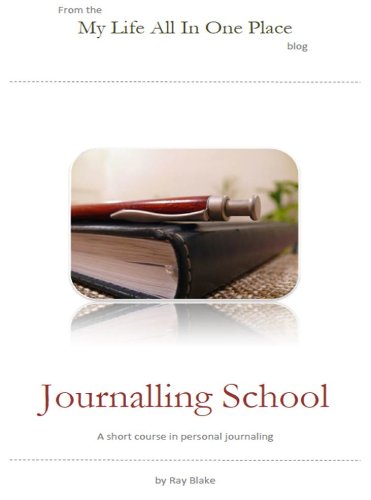Welcome to the tenth session of Journalling School. In today's session we'll be looking at the effect of tenses - past, present and future - and how to reflect these in your journalling.
Generally, we write in our journal about the day we are experiencing now. Although we probably write in the past tense ("I visit
ed Susan") it is present day we're talking about. But this is a convention, not a rule. There is no reason why we can't journal about the more remote past, or about the future.
In earlier sessions of Journalling School, I have encouraged you to look both backwards and forwards in time in your writing - backwards when you are catching up on a break in journalling, forwards when you are addressing your goals.
Today, we are going to take things a step further and write some time narratives to support change. A time narrative is a story really, but most stories begin and end in the past. These are stories that extend from the past into the future. The crucial difference here is that the ending has yet to be fixed.
Here is a very simple time narrative:
- In the past I have wasted money without thinking.
- Right now I am starting to record and review my spending and make economies where I can.
- In the future I will have built up savings and be financially secure.
Note that this narrative describes a change. The past and the future are very different from each other, and that difference is anchored in the present. The action I am taking now is the catalyst for change.
Here is another example:
- In the past I allowed my friends to take advantage of me.
- Right now I have decided to stand up for myself, to use assertiveness techniques and say 'no' sometimes.
- In the future I will enjoy more balanced relationships where my friends support me too.
I would call these examples 'outline' time narratives, because they summarise the story without giving any detail. Having written your outline, you need to go back and write about each of the three time episodes - the past, the present and the future - and build a much clearer, more detailed picture for each. You might spread this over several days, or decide to settle down for a long entry in your journal in one day.
For your picture of the past, describe how things have been. Give some examples and talk about how these made you feel. Describe why you want to make a change.
For the present, describe what action you are taking or are resolving to take. Keep this is the present tense ("I am saying 'no'" rather than "I will say 'no'".) If you are not sure on what action you need to take, you can use the problem solving techniques we looked at in Session 7. You can also talk to people, read and research in other ways.
For the future, really build a detailed picture of how things will be. Imagine some examples of the new skills or approaches and describe how you will act and how it will make you feel. Spend longer on this that you think is necessary. The time and detail you invest here are key to lasting and effective change. Your unconscious mind will absorb every word and become your invisible ally in helping to bring the change about.
Tense-shifting
Here is an interesting journaling exercise you can try from time to time. Try to imagine yourself one day in the future, when you'll be recording the events of the day and your feelings. Now write down today what you imagine you would be recording tomorrow.
When you get to tomorrow's session, read back what you wrote and consider how close your predictions came to your actual experience of the day. What had you foreseen perfectly, for instance, and what hadn't you anticipated at all?
Once you've done this a few times, look for themes. Are you surprised regularly by similar factors? Do you have any blindspots? How far do your expectations shape your experiences?
Another spin on this is to write tomorrow's entry based not on what you
expect to happen, but on what you
hope might happen.
What you're trying to do in this exercise is again to put your subconscious to work. It will try to find a way to produce the positive outcomes you describe, meaning your day is more likely to be a successful one.
Homework
If there is a pressing change you feel you need to make, then write your own time narrative to describe your journey from the past, thorough the present and into the future. Start with an outline that resembles the examples above. Then look at each stage in more detail - I'd recommend that you tackle the past on one day and the present and future on subsequent days. Take time out to do any talking or research that you need when it comes to the present.
If you don't have a particular change you need to make, then in your journal write tomorrow's entry today. Describe what you hope will happen as if it already has. Again, use detail to make the picture as vivid as possible and engage your unconscious in making it happen.
That was the tenth session of Journalling School. In the next session we'll be examining the power of looking back in your journal.
Feedback, thoughts and ideas are welcome, as ever. Please share your experiences in the comments.














